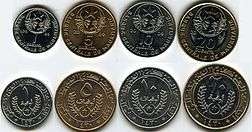Mauritanian ouguiya
| Mauritanian ouguiya | |
|---|---|
| أوقية موريتانية (Arabic) | |
|
Current coins | |
| ISO 4217 | |
| Code | MRO |
| Denominations | |
| Subunit | |
| 1/5 | khoums |
| Symbol | UM |
| Banknotes | 100, 200, 500, 1000, 2000, 5000 ouguiya[1] |
| Coins | |
| Freq. used | 5, 10, 20, 50 ouguiya[2][3] |
| Rarely used | 1 khoums (⅕ Ouguiya), 1 ouguiya |
| Demographics | |
| User(s) |
|
| Issuance | |
| Central bank | Banque Centrale de Mauritanie |
| Website |
www |
| Printer | Giesecke & Devrient |
| Website |
www |
| Valuation | |
| Inflation | 7.3% |
| Source | The World Factbook,[4] 2007 est. |
The ouguiya (sign: UM;[5] Arabic: أوقية; currency code: MRO), also spelt "ougiya",[6] is the currency of Mauritania. It is one of two circulating currencies, along with the Malagasy ariary, whose division units are not based on a power of ten, each ouguiya comprising five khoums (singular and plural in English, Arabic: خمس, meaning "one fifth").
The ouguiya was introduced in 1973, replacing the CFA franc at a rate of 1 ouguiya = 5 francs.
Coins
In 1973, ⅕ (1 khoums), 1, 5, 10 and 20 ouguiya coins were introduced. This was the only year that the khoums was minted, as the ouguiya was worth five CFA Francs a khoums was the equivalent of the franc (which had no subdivision). The most recent issues were in 2003 (1 ouguiya) and 2004 (other denominations). Coins are minted at the Kremnica mint in Slovakia. The coinage slightly changed in 2009, with a reduced 1 ouguiya in plated composition and a bi-metallic 20 ouguiya issued. A bi-metallic 50 ouguiya was issued December 2010.
Banknotes

In 1973, notes were issued by the Central Bank of Mauritania (Banque Centrale de Mauritanie) in denominations of 100, 200 and 1,000 ouguiya. In 1974, a second series of notes was issued in the same denominations, with 500 ouguiya notes added in 1979. Banknotes have been printed by Giesecke & Devrient in Munich, starting with the second issue. New banknotes were introduced in 2004. These notes have completely new fronts and the vignettes on the backs have been redesigned to accommodate the reduction in size. The 2,000-ouguiya denomination is entirely new. All but the 100- and 200-ouguiya notes have the denomination expressed in Arabic numerals in a holographic patch at right front. The serial numbers for all denominations now appear horizontally at upper left and lower center, and vertically at far right, all formatted with a 2-character prefix, 7-digit serial number, and 1-character suffix.[7] An entirely new 5,000-ouguiya denomination dated 28.11.2009 was introduced on 8 August 2010, followed by a redesigned 2,000-ouguiya note dated 28.11.2011 issued on 1 February 2012. [7]
Numismatic information
Within Nouakchott, the nation's capital, most coins are in fine to very fine condition; banknotes of 100 and 200 ouguiya tend to be in poor to fair condition, larger denominations are in fine to extremely fine condition.
The Central Bank is unhelpful in providing new condition coins and banknotes. Some interest in setting up a numismatic program exists, however.
| Current MRO exchange rates | |
|---|---|
| From Google Finance: | AUD CAD CHF EUR GBP HKD JPY USD |
| From Yahoo! Finance: | AUD CAD CHF EUR GBP HKD JPY USD |
| From XE: | AUD CAD CHF EUR GBP HKD JPY USD |
| From OANDA: | AUD CAD CHF EUR GBP HKD JPY USD |
| From fxtop.com: | AUD CAD CHF EUR GBP HKD JPY USD |
 Obverse of 1 ouguiya
Obverse of 1 ouguiya Reverse of 1 ouguiya
Reverse of 1 ouguiya
See also
References
- ↑ Billets, Banque Centrale de Mauritanie
- ↑ http://www.bcm.mr/MONNAIE/Pages/Pi%C3%A8ces.aspx
- ↑ "World Coin News". worldcoinnews.blogspot.com.
- ↑ "The World Factbook". cia.gov.
- ↑ http://www.bcm.mr/Pages/accueil.aspx
- ↑ Oxford Dictionary of English
- 1 2 Linzmayer, Owen (2012). "Mauritania". The Banknote Book. San Francisco, CA.
External links
| Preceded by: CFA franc Ratio: 1 ouguiya = 5 francs |
Currency of Mauritania 1973 – |
Succeeded by: Current |
